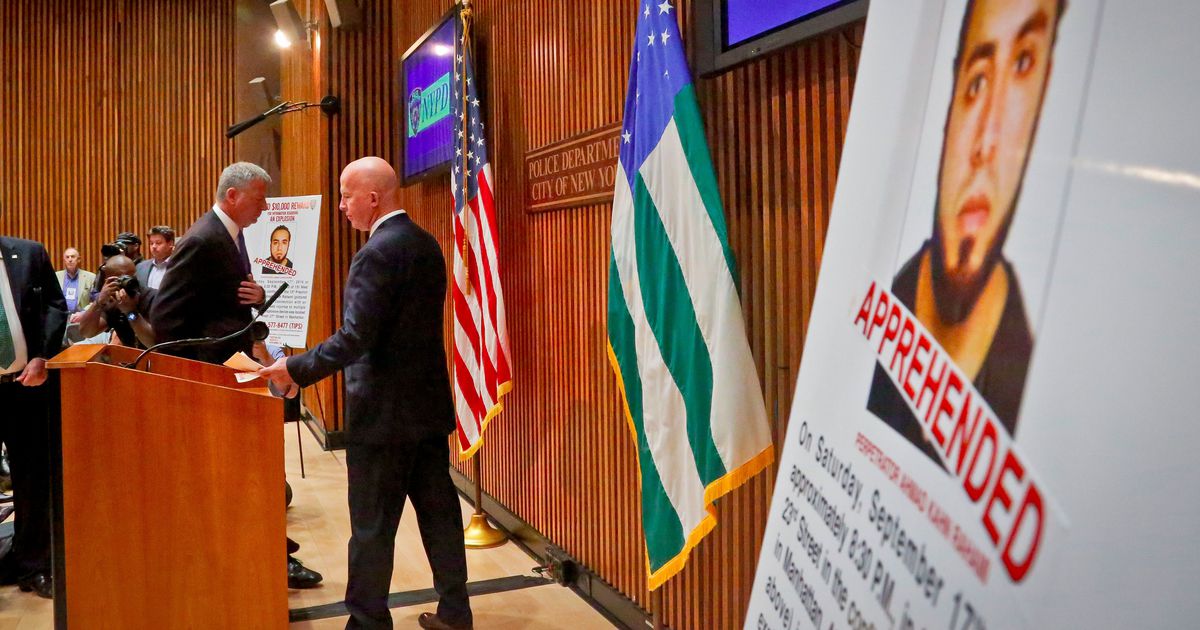What happens to suspected New York bomber now that he’s arrested?


UPDATE: Sept. 20, 2016 7:15 p.m. ET Updated to include local and federal charges related to the bombs and his arrest.
The suspect believed to have set bombs in several locations across New York and New Jersey this past week was charged with five counts of attempted murder after he was arrested on Monday following a gun battle with police in Linden, New Jersey.
But those charges are not likely to be the ones for which 28-year-old Ahmad Rahami is remembered. On Tuesday, federal charges, including having a weapon of mass destuction, were filed against the young man.
Struggles of jurisdiction between local and federal law enforcement sometimes spring up in the wake of cases that involve extremists and make headlines across the country. But the FBI is almost always in charge when a suspect may be charged with terrorism.
“It’s not unusual to just charge something on somebody and then have federal charges later,” Brian Levin, a former NYPD officer who now directs the Center for the Study of Hate and Extremism at California State University, San Bernardino, told Mashable.
Reports have suggested that Rahami was not read his Miranda rights after he was arrested on Monday. He was taken to a hospital, where he underwent surgery for his bullet wounds, and the FBI is likely to question him there when Rahami has sufficiently recovered, according to Levin.
The FBI’s legal ability to do this stems from a 1984 Supreme Court case in which the court ruled law enforcement can question a suspect without reading the suspect his rights whenever there is a “public safety exemption,” meaning an officer believes the suspect has knowledge of something that can still do harm to the public. The information obtained from these interviews can be used in court.
Given that Rahami is suspected of having dropped pipe bombs and pressure cooker bombs at multiple locations in multiple states, it’s possible this exemption could be invoked and would hold up under legal scrutiny.
The FBI may also be looking at whether it can declare Rahami an “enemy combatant.” They might be able to do this if, for example, investigators believe they can prove Rahami has pledged allegiance to an organization with which the United States is in conflict, such as al-Qaeda.
Why hasnt Ahmad Khan Rahami been read his legal rights? @PaulCallan
Says he isnt surprised. Heres why: https://t.co/kYFMMofUQNCarol Costello (@CarolCNN) September 20, 2016
“If that’s the case, he wouldn’t necessarily have the right to counsel right away the way a regular American suspect would,” Paul Callan, a high-profile attorney and CNN legal analyst, said Tuesday on the cable network.
Officials are likely looking at charges under section 844 of the U.S. legal code, according to Levin. That section deals with charges of using explosives in attempts to kill and injure people or to illegally destroy property.
The events surrounding Rahami resemble the Boston Marathon bombings in 2013 that killed three people and injured 264, according to Levin and Zachary Goldman, the executive director of the Center on Law and Security at New York University.
Both cases involved homemade explosives dropped off by the attackers, who later got into gun battles with police.
Only one of the two Boston bombers survived the pursuit of the law in the days following the blasts. Dzhokhar Tsarnaev was convicted of terrorism and sentenced to death, the first such sentence for a convicted terrorist since Sept. 11, 2001.
Tsarnaev now resides in the Alcatraz of the Rockies, a supermax prison in Florence, Colorado where inmates convicted on terrorism charges are often sent. He’s there along with Richard Reid, known as the “shoe bomber,” as well as Umar Farouk Abdulmutallab, known as the “underwear bomber.”
Inmates at ADX Florence spend 23 hours a day in solitary confinement.
Read more: http://mashable.com/2016/09/20/ahmad-rahami-what-happens-when-suspected-terrorist-arrested/